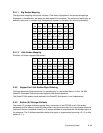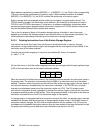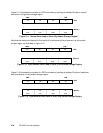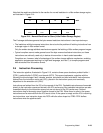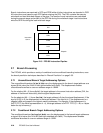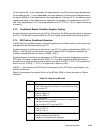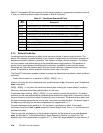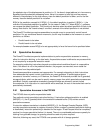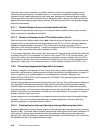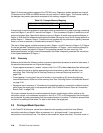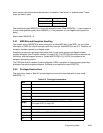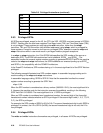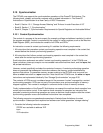
Programming Model 2-27
the algebraic sign of the displacement is positive (s = 0), the branch target address is in low memory.
Because these are absolute-addressing forms, there is no reason to treat high and low memory
differently. Nevertheless, for the high memory case the default prediction is taken, and for the low
memory case the default prediction is not taken.
BO[4] is the
prediction reversal bit
. If BO[4] = 0, the default prediction is applied. If BO[4] = 1, the
reverse of the standard prediction is applied. For the cases in Table 3-17 where BO[4] =
y
, software
can reverse the default prediction. This should only be done when the default prediction is likely to be
wrong. Note that for the “branch always” condition, reversal of the default prediction is not allowed.
The PowerPC Architecture requires assemblers to provide a way to conveniently control branch
prediction. For any conditional branch mnemonic, a suffix may be added to the mnemonic to control
prediction, as follows:
+ Predict branch to be taken
− Predict branch to be not taken
For example, bcctr+ causes BO[4] to be set appropriately to force the branch to be predicted taken.
2.8 Speculative Accesses
The PowerPC Architecture permits implementations to perform speculative accesses to memory,
either for instruction fetching, or for data loads. A speculative access is defined as any access which
is not required by a sequential execution model.
For example, prefetching instructions beyond an undetermined conditional branch is a speculative
fetch; if the branch is not in the predicted direction, the program, as executed, never needs the
instructions from the predicted path.
Sometimes speculative accesses are inappropriate. For example, attempting to fetch instructions
from addresses that cannot contain instructions can cause problems.To protect against errant
accesses to “sensitive” memory or I/O devices, the PowerPC Architecture provides the G (guarded)
storage attribute, which can be used to specify memory pages from which speculative accesses are
prohibited. (Actually, speculative accesses to guarded storage are allowed in certain limited
circumstances; if an instruction in a cache block will be executed, the rest of the cache block can be
speculatively accessed.)
2.8.1 Speculative Accesses in the PPC405
The PPC405 does not perform speculative loads.
Two methods control speculative instruction fetching. If instruction address translation is enabled
(MSR[IR] = 1), the G (guarded) field in the translation lookaside buffer (TLB) entries controls
speculative accesses.
If instruction address translation is disabled (MSR[IR] = 0), the Storage Guarded Register (SGR)
controls speculative accesses for regions of memory. When a region is guarded (speculative fetching
is disallowed), instruction prefetching is disabled for that region. A fetch request must be completely
resolved (no longer speculative) before it is issued. There is a considerable performance penalty for
fetching from guarded storage, so guarding should be used only when required.
Note that, following any reset, the PPC405 core operates with all of storage guarded.



